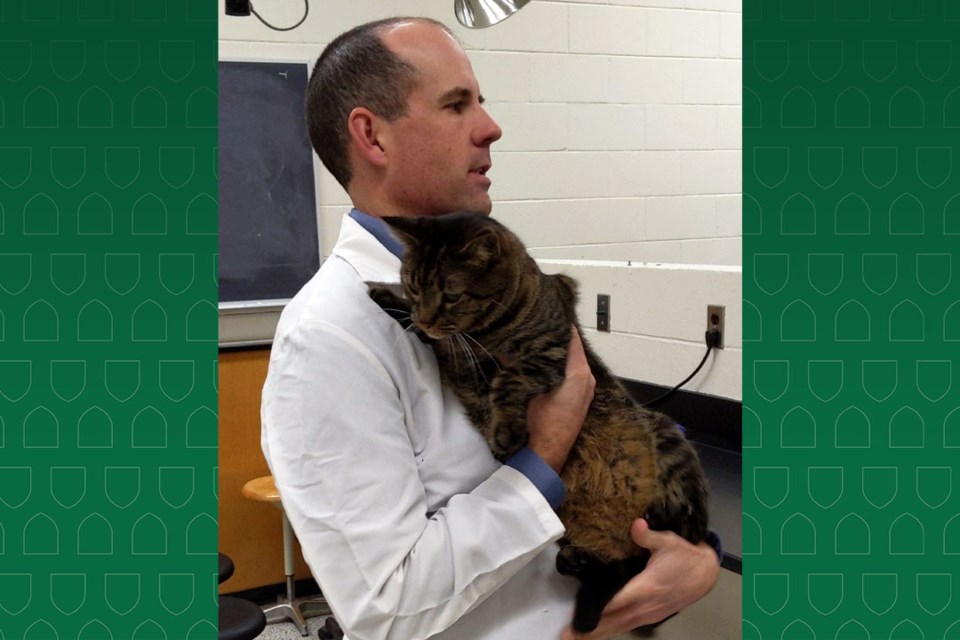SASKATOON — A recent recipient of the 2023 University of Saskatchewan (USask) Provost’s Outstanding New Teaching Award, Al Chicoine says students need to know their professors care about their success.
During a recent interview with the Gwenna Moss Centre for Teaching and Learning (GMCTL) , Assistant Professor Dr. Al Chicoine (DVM) spoke about this passion for teaching.
Chicoine, from the Department of Veterinary Biomedical Sciences, is an alumnus, a veterinarian who specializes in clinical pharmacology, and the 2023 recipient of the Provost’s Outstanding New Teaching Award.
Chicoine said sometimes instructors forget what it’s like to be students, and that students know right away which professors really want them to succeed versus those who are teaching simply because they were assigned that course.
He said it made an important difference to him when he was a student when faculty brought energy and passion to their work, and he vowed when “if ever on the other side of the fence,” that he’d bring that same level of energy and passion to hopefully make the material more tolerable.
“The material isn’t always going to be a ton of fun, but knowing that the instructor cares, is passionate, and really wants the students to learn, I think goes a long way in helping the students get through the program.”
Chicoine uses a “two-prong approach” to instil resiliency in his students: build confidence and help give them perspective on challenges they face today so they can handle challenges upon graduating.
He said some students approach challenges by trying to remove them but reminds the students that challenges will always be there.
“Our students are going to get knocked down – metaphorically, although I guess sometimes literally with horses, cows, and big dogs – during the course of their studies, and throughout their career. There is just no way around that.”
“Resilience is the ability to keep on going and to not shy away from those difficulties. It sounds easy in principle, but it’s hard in real life,” Chicoine added.
He said current stresses most students face at university can help put things in perspective later in life.
“What happens when you have an animal die and it’s your case? Maybe you didn’t make a mistake, but these things happen, and the client is really upset and they’re yelling at you,” said Chicoine. “It happens to every vet at some point in time. Can you get up from that sort of a situation?”
Chicoine simulates situations like that during a communication session with students where they role play a veterinarian and discuss a challenging situation like a pet dying, a medical mistake, or a difficult diagnostic process.
“It’s hard, it’s uncomfortable, and it’s uncomfortable for me as facilitator/coach,” Chicoine said. “But almost universally, the students really appreciate it on the other side. They tell me, ‘That was really hard, I was stressed out about it, it wasn’t pleasant, but I got through it. I think when I’m faced with it in the real world, I know I can get through it again.’”
In addition to providing perspective, Chicoine said there should be an emphasis on instilling confidence.
“In a very difficult and rigorous program like veterinary medicine, students focus on the negatives. They’re used to –°¿∂ ”∆µ very high achieving students, and all of a sudden, they can’t excel in everything.”
Chicoine said it’s his job to help them understand how far they’ve come and how much they actually do know in order to build that confidence.
Chicoine is humble when asked what kind of advice he would offer other instructors on cultivating resilience in their students. He said one of the challenges is that he’s unsure of the best way to measure resilience.
"I don’t have proof that what I’m doing is working. I have anecdotes, but in terms of actually assessing resilience, it feels like a blind spot. It’s the number one characteristic we’d like our graduates to have, but I’m not sure we have a good way to assess that.”
To hear more of Chicoine’s interview, as well as interviews with other award-winning instructors, .
— Submitted by USask Media Relations




